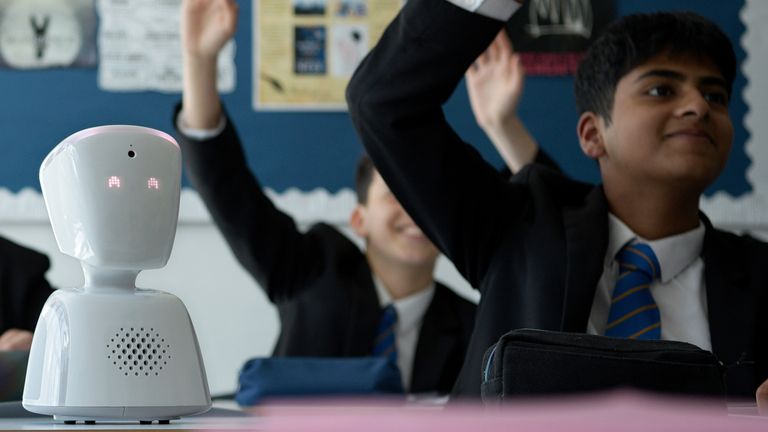Robots could sit in the seats of absent children in school – to allow the pupils to access lessons from a “safe space”, a former children’s commissioner has said.
Anne Longfield, executive chair of the Centre for Young Lives, said that developing a “more inclusive” school environment could help tackle the attendance crisis – rather than a “one-size-fits-all” approach, in a new report.
It outlined the potential use of telepresence AV1 robots as one potential strategy.
It comes as she warned that threatening parents with “punitive” fines when their child misses school is not reducing absences.
A new report from the Centre for Young Lives thinktank and the Child of the North initiative said headteachers had found that strategies to tackle pupil absence prior to the COVID pandemic were no longer as effective.
It also said that early data from a pilot project in Wirral, Merseyside, found that telepresence robots could help tackle engagement and attendance issues.
The paper highlighted the AV1 telepresence robots, made by the company No Isolation, as one of the alternative programmes that could help.
The robots would sit in an absent child’s seat in class and allow them to access a lesson live while in a “safe space” elsewhere – whether still on-site at school, or at home.
Due to this, they helped boost attendance by as much as 21% and increase the number of hours pupils engaged with learning by 42%, the report said.
The report continued: “As part of their programme, Wirral Emotionally Based School Avoidance Strategy are using the AV1 device, a telepresence robot that enables children to access their education remotely.
“The robot sits in the young person’s seat in class, and they access a live stream of the lesson via an electronic tablet in a safe space (eg at home or an intervention room within school).”
Ms Longfield, a former children’s commissioner for England, added: “The reasons why children miss school are often complex and there is no silver bullet.
“However, the one-size-fits-all and often punitive approach that previous governments have taken to tackle absence needs to be consigned to the past.
“Simply, threatening parents with fines is not working for many families and not reducing severe absence rates.”
As part of a government drive to boost school attendance post-COVID, the fines parents face for taking their children out of school without permission have risen this year.
Absence fines have increased from £60 to £80 and a parent who receives a second fine for the same child in a three-year period will automatically receive a £160 fine.
Other actions, like a parenting order or prosecution, will be considered if a parent exceeds two fines per child within a three-year period.
Those prosecuted could receive a fine of up to £2,500.
Meanwhile, figures released last week suggested that the number of pupils in England missing at least half of possible school lessons has continued to tick upwards.
About 158,000 pupils were “severely absent” over the autumn and spring terms of 2023-24, compared to 139,000 over the same period in 2022-23, according to data from the Department for Education.

